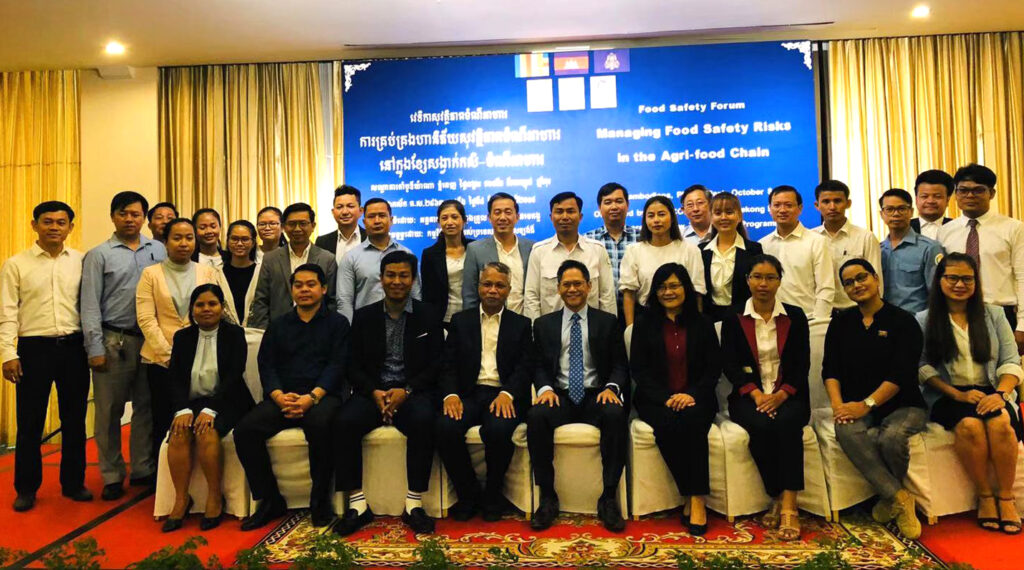Mekong Institute (MI) and the Cambodia Import-Export Inspection and Fraud Repression Directorate-General (Camcontrol), with the support of the New Zealand Aid Programme (NZAP), held the Food Safety Stakeholder Forum on Managing Food Safety Risks in the Agri-food Chain at Cambodiana Hotel, Phnom Penh last October 8. This is the second forum organized under MI’s Promoting Safe Food for Everyone (PROSAFE) Project.
Representatives from government agencies, the private sector, academic and research institutions as well as 35 MI alumni from eight PROSAFE regional training programs attended the forum which served as a venue for knowledge exchange on experiences and lessons learned. The discussions provided the participants with better understanding of the food safety situation and how to proactively manage risks in all stages of the agricultural value chain. By gathering key actors from different sectors, the forum established a strong network among MI alumni and Cambodian food safety stakeholders to explore possible areas for future collaboration.
MI Executive Director Dr. Watcharas Leelawath emphasized the organization’s shared commitment with NZAP on promoting food safety in Cambodia, Laos, Myanmar, and Vietnam (CLMV) through the five-year project. He then provided a brief background of the PROSAFE Project and its key activities including delivering safe food courses that address various issues along the food supply chain alongside providing post-training outreach support to its participants. With the increased globalization of food trade, rapid growth of the agri-food industry, advances in science and technology, and changes in consumer behavior, Dr. Leelawath underscored the importance of having reliable national food safety systems that are capable of dealing with various food safety challenges and demands. “The implementation of preventive measures in the agri-food industries can manage, reduce, and prevent food safety risks along the entire supply chain,” he concluded.
H.E. Mr. Dim Theng, Advisor to the Ministry of Commerce and Deputy Director General of Camcontrol, welcomed and thanked the participants for attending the forum. He then highlighted that access to safe food is essential for everybody as it is a central element of public health and therefore, is crucial in achieving the 2030 Sustainable Development Goals. “Managing food safety risks in agri-food chains is fundamentally multidisciplinary. Agri-food chains serve as vital links in the agricultural production of food – from production to processing, trading, distribution, and consumption”, he added. H.E. Mr. Theng also called on the need for stronger implementation and collaboration to ensure food safety standards at all stages of the supply chain that will consequently lead to enhanced consumer health protection as well as increased international trade.
MI Country Coordinator to Cambodia Mr. Ra Thorng kicked-off the event with an overview of the forum and a presentation on the fundamentals of the agri-food chain and how to manage challenges of safety and quality along the food supply chain. Presentations from Camcontrol on (i) market surveillance and consumer protection program and (ii) food standards and labeling requirements for processed agri-food were led by H.E. Mr. Dim Theng and Mr. Ly Tin, respectively. It was followed by two presenters from the private sector who shared experiences in managing food safety risks in agricultural production and processing stages with focus on the implementation of preventive measures.
The forum concluded with an interactive discussion on the five main elements of a national food safety system including laws and regulations, food safety control management, inspection and certification, monitoring and market surveillance program, and information, education, communication and training. The participants reviewed the existing and lacking components of the system and strategized ways to address the gaps.
The PROSAFE Project is anchored on ensuring safety and quality standards throughout all stages of the supply chain. Aside from managing food safety risks at the onset, particularly in the agri-food chain, the Project also covers postharvest safe food handling practices, food hygiene and sanitation, food safety management tools, food emergency management, and raising public awareness. To learn more, please visit PROSAFE: PROMOTING SAFE FOOD FOR EVERYONE








